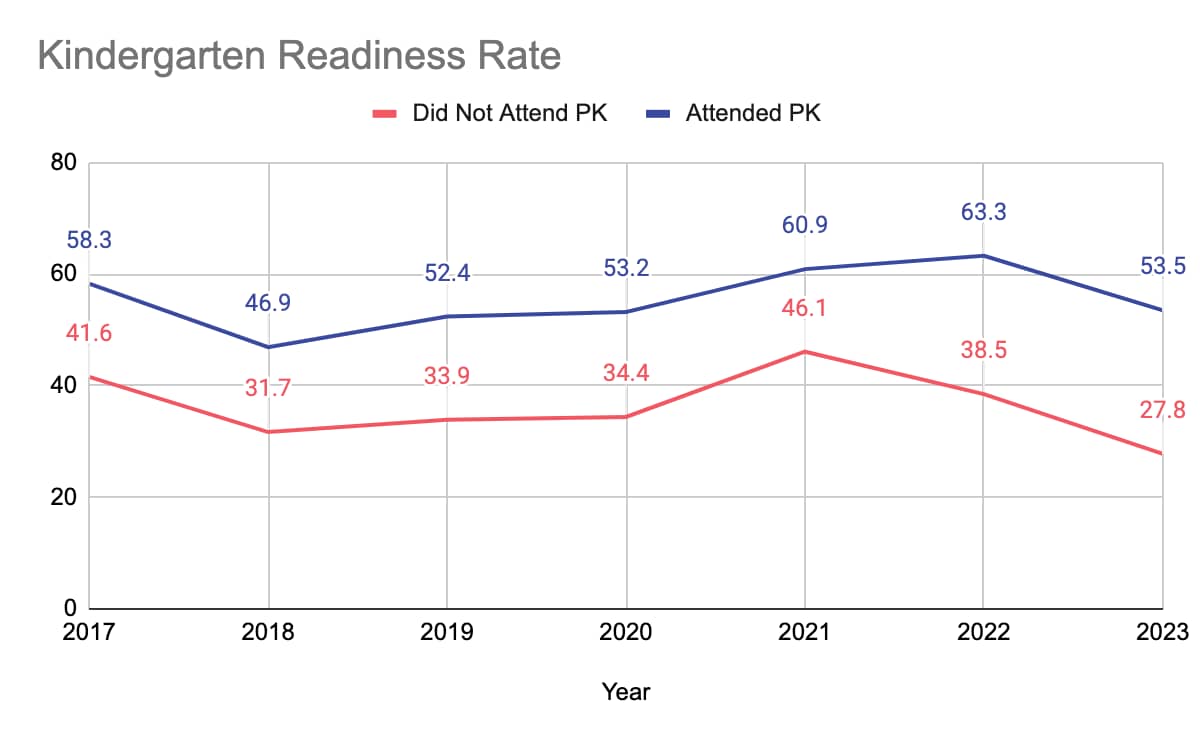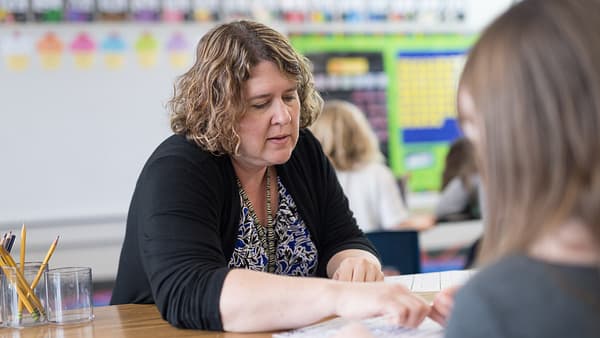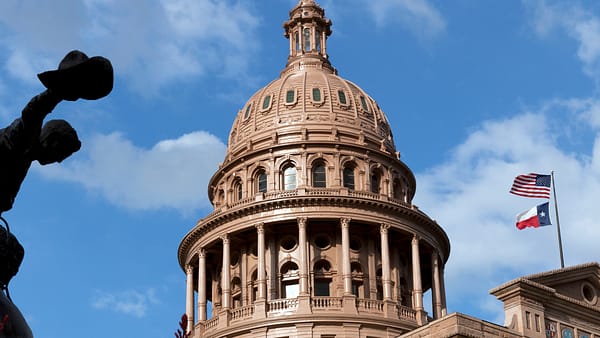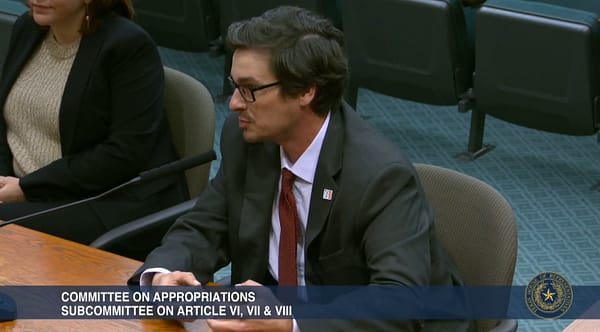The Future Starts Here: Early education and childcare
This is a preview of our Texas 2036 newsletter on how our decisions now on early education and childcare affect the Texas the next generation of Texans will inherit. To receive this weekly look at our work, sign up here.
Are we setting Texas children up for success?

Last year, only 40% of Texas voters told us that future generations of Texans would have the same or better opportunities than previous generations.
We need to change that. That’s why the decisions we make today will define Texas’ future. Here’s how Texas 2036 is taking action on education and childcare opportunities this session.
The Case for Smarter Early Ed Investments

For the 1.8 million students now enrolled in pre-K through third grade, every moment counts. But today’s data tells a troubling story.
📚 52% of third graders are not reading on grade level.
- for economically disadvantaged third grade students, 62% are not reading on grade level.
➗✖️ 58% of third graders are not performing math on grade level.
And here’s the real issue: If a child isn’t on grade level by third grade, their odds of catching up are slim.
🚨 Only 18% of third graders who fell behind in reading in 2019 were able to catch up by middle school. In math, only 13% caught up. (Source: Commit analysis of student-level STAAR scores 2019-2022, Texas Education Agency)
A strong start is key to long-term academic success. Unfortunately, the kindergarten readiness gap between those students who attended pre-K and those who did not is widening, from about 15 percentage points in 2021 to nearly 26 percentage points in 2023.
 Source: TEA TAPR
Source: TEA TAPR
Texas teacher training and early interventions can improve early education outcomes

Students who attend pre-K are nearly twice as likely to start kindergarten ready to learn. But without strong instruction, these early gains fade.
A recent Rand study showed that only 36% of Texas elementary and middle school principals said all or almost all of their math teachers had a deep knowledge of math instruction.
As The Hechinger Report noted, kindergarten might be the most important year for math instruction but is derailed partly by teachers unprepared to teach math.
 “We often accept the idea that some people just aren’t math people. That is not a failure of students, but rather can be a failure of policy.”
“We often accept the idea that some people just aren’t math people. That is not a failure of students, but rather can be a failure of policy.”
📺 Testimony: Gabe Grantham, Policy Advisor
🔎 Bills to watch: House Bill 123 by state Rep. Harold Dutton Jr., D-Houston, and Senate Bill 2252 by state Sen. Brandon Creighton, R-Conroe, would expand existing high quality teacher training through reading and math academies, which are aimed at improving early education teacher instruction and ensuring that teachers are equipped with the best practices in literacy and math instruction.
Here’s a quick breakdown of what else HB 123/SB 2252 would do:
- Early literacy and numeracy progress — the bill ensures that school districts utilize approved reading and numeracy screeners, equipping teachers and parents with accurate and actionable information about the academic progress of their students.
- Early literacy intervention — the bill also provides supports and interventions for students who consistently struggle in literacy, based on the results of the screeners, to ensure that they are on grade level by the end of third grade.
- If a district utilizes a high-quality, approved, research-based reading intervention, the district is entitled to an additional $250 per student, capped at 10% of enrolled K-3 students.

- Provide parent notification requirements when students are shown to be off track.
- Grant parents access to state high-quality instructional materials that they can use to help their children succeed.
 Did you know? In states like Mississippi and Alabama, intensive investments in teacher coaching are already yielding measurable progress among elementary students.
Did you know? In states like Mississippi and Alabama, intensive investments in teacher coaching are already yielding measurable progress among elementary students.
In fact, Alabama is the only state where fourth grade math scores have surpassed pre-COVID scores.
Texas voters support early ed intervention

Texas voters know this matters. Big bipartisan majorities support stronger parental notifications to identify students at risk of falling behind academically.
- 89% of Texas voters support requiring schools to identify students struggling to read prior to third grade and as early as kindergarten. (Ragnar Research Partners, Commit Statewide Poll (Nov. 2024))
- 91% of Texas voters support schools being required to provide additional support to struggling readers early on so they can read at grade level by third grade. (Ragnar Research Partners, Commit Statewide Poll (Nov. 2024))
- 79% of Texas voters favor requiring schools to notify parents starting in kindergarten if their child is not on grade level in math. (Source: 8th Texas 2036 Voter Poll, Nov. 16-20, 2024)
Affordable childcare is key to economic mobility

Studies estimate that the state’s economy loses as much as $11.4 billion annually due to productivity and revenue losses specifically due to childcare for parents, businesses and taxpayers. (Source: LBJ School of Public Affairs at UT-Austin)
👶 60%: the share of non-working parents who cite childcare as a top reason for not participating in the workforce. (Source: The Best Place for Working Parents)
📊 70% of Texas voters told us that they did not think most working Texas parents have access to affordable childcare options. (Source: 6th Texas Voter Poll, Feb. 1-6, 2023)
📊 74% of Texas voters expressed concern about the availability of affordable childcare options, with 45% saying they were either very concerned or extremely concerned. (Source: 8th Texas 2036 Voter Poll, Nov. 16-20, 2024)

The average annual cost in 2023 of childcare for toddlers in Texas was $8,718.
🙌 Did you know? Texas 2036 was a founding member of the Employers for Childcare Task Force, which works to develop and advocate for public policy reforms to expand working families’ access to affordable, quality childcare.
Solution: Use smarter data in childcare policies

In February testimony, Director of Health and Economic Mobility Policy Charles Miller testified on programs that would improve childcare affordability in Texas as part of the Employers for Child Care coalition, including:
- Early Childhood Integrated Data System: a program that collects, integrates, maintains, stores and reports information from early childhood programs across multiple agencies that serve children and families from birth to age eight.
“As we are looking at how do we solve these problems intelligently, we need to make sure that data is being shared more intelligently.“
📺 Testimony: Charles Miller, Director of Health and Economic Mobility Policy
Lawmakers can also think about ways to address the childcare availability and affordability challenge beyond the current legislative session:
- Regulation of childcare is currently fragmented among various state agencies, which leads to gaps, redundancies and inconsistencies in standards and enforcement.
- With the workforce and health and human services commissions scheduled for Sunset review next legislative cycle, lawmakers have an opportunity to look at regulation of childcare in Texas.
- Some providers have reported that existing childcare regulations can be inconsistent, or even contradictory, between agencies. These regulations could be evaluated to ensure they are tailored to meet health and safety objectives in an understandable and cost-effective manner.
- One option? The creation of a Governance Task Force to make recommendations delivered in advance of the Sunset process.
🔎 Bills to watch: HB 2271 by state Rep. Armando Walle, D-Houston, would collect data to allow parents to find locations of day-care centers, group day-care homes and family homes that have available openings.
HB 117 by state Rep. Alan Schoolcraft, R-McQueeney, would establish a governor’s task force on the governance of early childhood education and childcare.
SB 2049 by state Sen. Brian Birdwell, R-Granbury/HB 4903, by state Rep. Caroline Harris Davila, R-Round Rock, would establish the Quad-Agency Child Care Initiative Commission.
We want to hear from you.

Is affordable childcare a priority for you this legislative session?
Let us know your thoughts.
